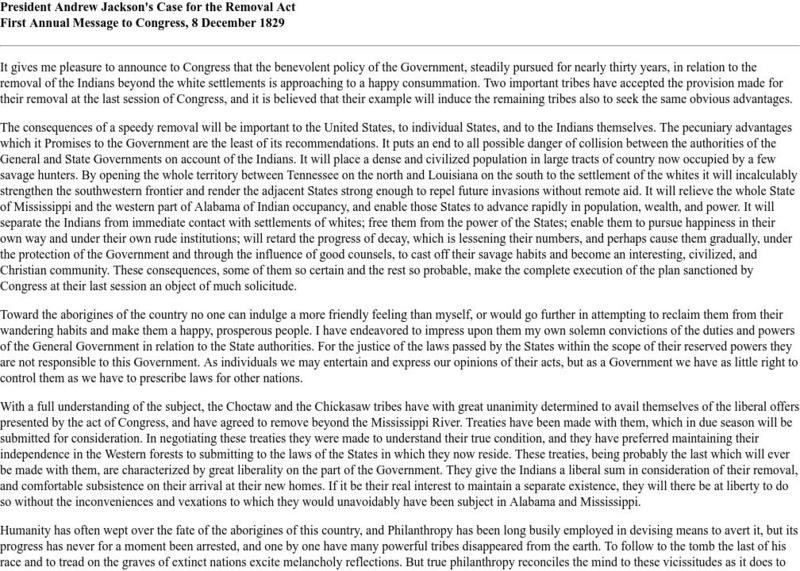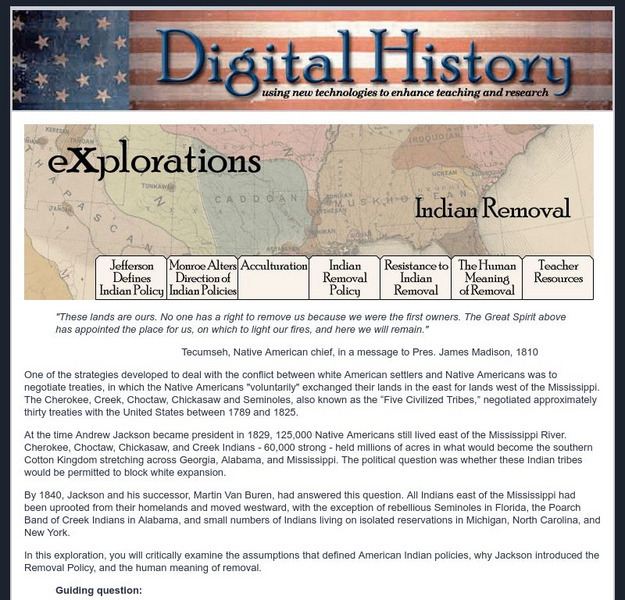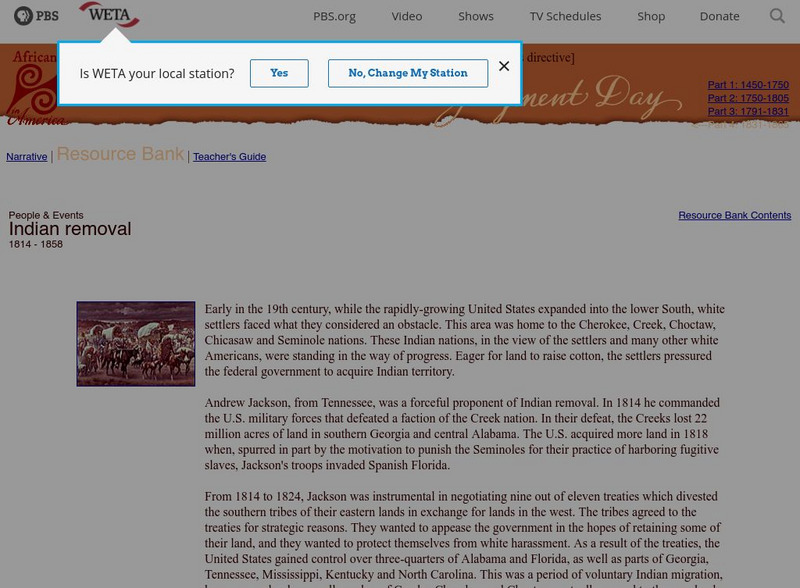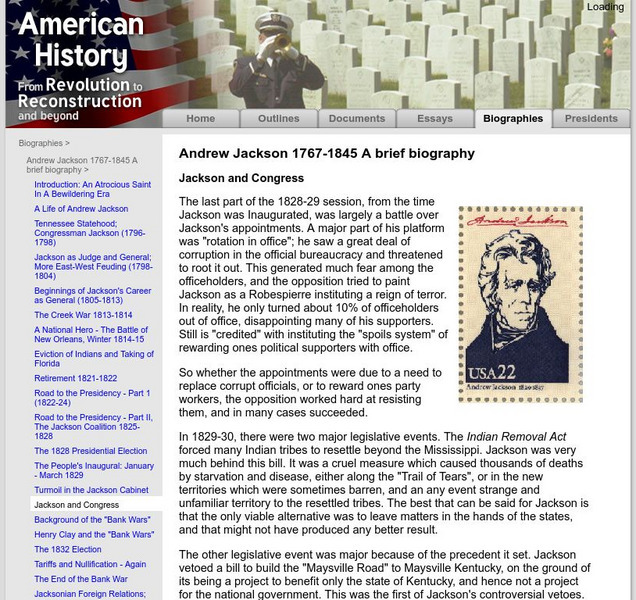Curated OER
The Cherokee Removal
Eleventh graders examine the issue of Cherokee removal from the perspectives of Andrew Jackson, members of Congress, and members of the Cherokee nation. They adopt the perspectives and engage in debate over the issue of Cherokee removal.
Curated OER
Native Lands: Indians in Georgia , Losing Ground: Removal, 1802-1838
Young scholars investigate the removal of the Creek Indians from Georgia. Students read the story of the Creek removal from Georgia, locate sites mentioned on a map, and create a related timeline. Young scholars share their thoughts on...
Curated OER
The Trail of Tears by Joseph Bruchac
In this Trail of Tears activity, students fill in the blanks with words given to the Trail of Tears. Students fill in 19 blanks on this activity.
Constitutional Rights Foundation
Constitutional Rights Foundation: Indian Removal: The Cherokees, Jackson, and the "Trail of Tears"
Collaborative and consensus building activity on U.S. policy and treatment of Native Americans. Lesson provides an in-depth look at government Indian removal and provides a list from which students choose and defend a Native American...
Mount Holyoke College
International Relations: Andrew Jackson's Case for the Removal of Indians
Here, read the text to President Jackson's "First Annual Message to Congress, 8 December 1830," in which Jackson argues for the removal of Native Americans.
PBS
New Perspectives on the West: Indian Removal: Andrew Jackson' Annual Message
Jackson was instrumental in removing the Indian population from the South. This site presents the section from his 7th annual address to Congress which deals with his Indian removal policy.
University of Virginia
Miller Center at Uva: u.s. Presidents: Andrew Jackson: Domestic Affairs
A comprehensive overview of the domestic issues facing Andrew Jackson in his presidency, from the "spoils system" to veto of the bank recharter to his Indian removal policy.
Digital History
Digital History: Explorations: Indian Removal
In this exploration, students will examine the federal policy toward American Indians, why President Jackson introduced the Indian Removal Policy, Native American resistance to removal, and the human meaning of removal.
US National Archives
Our Documents:president Jackson's Message to Congress 'On Indian Removal' (1830)
On December 6, 1830, President Jackson spoke to Congress about his position on relocating Indians in order to make way for settlers in the west. This paved the way for government policy in dealing with native peoples even after his...
US National Archives
Our Documents: President Andrew Jackson's Message, 'On Indian Removal'
Interactive image of the original document through which President Andrew Jackson called for "Indian Removal," in 1830. Includes transcription as well as background and overview of the text and results of the Indian Removal policy.
Khan Academy
Khan Academy: The Presidency of Andrew Jackson
This Khan Academy resource provides information surrounding the Presidency of Andrew Jackson, including his successes and failures.
Digital History
Digital History: Indian Removal
The Indian Removal policy was inhumane and without empathy for the Native Americans who were forced from their lands. Read about the attempts to enforce federal treaties and the final removal of three major tribes from the Southeast.
Ohio State University
Osu History Teaching Institute: Indian Removal
This lesson looks at the process whereby a policy of assimilation gave way to one of overt removal under President Jackson.
A&E Television
History.com: Native American History Timeline
Before Christopher Columbus came to America, the expansive territory was inhabited by Native Americans. Throughout the 16th and 17th centuries, as more explorers sought to colonize their land, Native Americans responded in various...
Gilder Lehrman Institute of American History
Gilder Lehrman Institute: History by Era: The Age of Jackson
[Free Registration/Login Required] Read about the growth of the United States in population, economy, territory during the Age of Jackson. Named after the dynamic president, Andrew Jackson, the age encompassed much more than Jackson's...
Smithsonian Institution
Smithsonian: National Museum of the American Indian: The Removal Act
At first, the Trail of Tears only described the Cherokee removal of 1838. Later it included the removals of all southeastern Native nations. Take a close look at these primary sources from the Smithsonian which include a reproduction of...
CommonLit
Common Lit: Andrew Jackson's Speech to Congress on "Indian Removal"
A learning module that begins with "Andrew Jackson's Speech to Congress on 'Indian Removal'" by President Andrew Jackson, accompanied by guided reading questions, assessment questions, and discussion questions. The text can be printed as...
Khan Academy
Khan Academy: Us History: 1800 1848: Indian Removal
In the 1830s, President Andrew Jackson pursued a policy of Indian Removal, forcing Native Americans living in Georgia, Florida, and Mississippi to trek hundreds of miles to territory in present-day Oklahoma.
PBS
Pbs: Indian Removal Andrew Jackson's Role
This site from PBS shows that Jackson was instrumental in the removal of the Cherokee population from Georgia and Florida. This site discusses his role in that policy. Links to related sites. Bibliography available at "Resource Bank" page.
University of Groningen
American History: Biographies: Andrew Jackson: Jackson and Congress
As part of this larger biography of Andrew Jackson is this discussion of his relationship to Congress. Included are his attempt to correct the corruption in the bureaucracy and the major legislative events of his presidency.
Digital History
Digital History: Democracy and President Jackson [Pdf]
Andrew Jackson was a larger than life individual. Read about his successes before his election to the presidency and find out about his policies once he became president. [pdf]
Annenberg Foundation
Annenberg Learner: Reading Like a Historian
During this 8-day unit, students will engage in collecting text evidence and then writing about their findings. They will answer the following question with credible, well-explained evidence: Why did Andrew Jackson and Elias Boudinot...
Independence Hall Association
U.s. History: The Trail of Tears: The Indian Removals
The Cherokee were not the only Native Americans affected by the Indian Removal Policy. Read about the Sac and Fox Indians in Illinois, and the Seminole in Florida. In addition, read about the many attempts, including a law suit filed by...
Digital Public Library of America
Dpla: Cherokee Removal and the Trail of Tears
The sources in this primary set uses documents, images, and music to reveal the story of Cherokee removal, which is part of a larger story known as the Trail of Tears. Includes teaching guide.

















